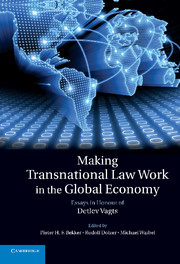Book contents
- Frontmatter
- Contents
- List of contributors
- Foreword: the transnationalism of Detlev Vagts
- List of cases cited
- List of abbreviations and acronyms
- Introduction: a Festschrift to celebrate Detlev Vagts' contributions to transnational law
- 1 Detlev Vagts and the Harvard Law School
- 2 Constructing and developing transnational law: the contribution of Detlev Vagts
- I International law in general
- 3 ‘Hegemonic international law’ in retrospect
- 4 Textual interpretation and (international) law reading: the myth of (in)determinacy and the genealogy of meaning
- 5 The changing role of the State in the globalising world economy
- 6 Sources of human rights obligations binding the UN Security Council
- 7 Is transnational law eclipsing international law?
- 8 Participation in the World Trade Organization and foreign direct investment: national or European Union competences
- 9 From dualism to pluralism: the relationship between international law, European law and domestic law
- 10 Transnational law comprises constitutional, administrative, criminal and quasi-private law
- 11 Founding myths, international law, and voting rights in the District of Columbia
- 12 The tormented relationship between international law and EU law
- 13 International law scholarship in times of dictatorship and democracy: exemplified by the life and work of Wilhelm Wengler
- II Transnational economic law
- III Transnational lawyering and dispute resolution
- Bibliography of Detlev Vagts
- Index
3 - ‘Hegemonic international law’ in retrospect
from I - International law in general
Published online by Cambridge University Press: 17 November 2010
- Frontmatter
- Contents
- List of contributors
- Foreword: the transnationalism of Detlev Vagts
- List of cases cited
- List of abbreviations and acronyms
- Introduction: a Festschrift to celebrate Detlev Vagts' contributions to transnational law
- 1 Detlev Vagts and the Harvard Law School
- 2 Constructing and developing transnational law: the contribution of Detlev Vagts
- I International law in general
- 3 ‘Hegemonic international law’ in retrospect
- 4 Textual interpretation and (international) law reading: the myth of (in)determinacy and the genealogy of meaning
- 5 The changing role of the State in the globalising world economy
- 6 Sources of human rights obligations binding the UN Security Council
- 7 Is transnational law eclipsing international law?
- 8 Participation in the World Trade Organization and foreign direct investment: national or European Union competences
- 9 From dualism to pluralism: the relationship between international law, European law and domestic law
- 10 Transnational law comprises constitutional, administrative, criminal and quasi-private law
- 11 Founding myths, international law, and voting rights in the District of Columbia
- 12 The tormented relationship between international law and EU law
- 13 International law scholarship in times of dictatorship and democracy: exemplified by the life and work of Wilhelm Wengler
- II Transnational economic law
- III Transnational lawyering and dispute resolution
- Bibliography of Detlev Vagts
- Index
Summary
Introduction
My first encounter with Professor Detlev Vagts took place far from Cambridge, Massachusetts. I was browsing through the foreign law section in the library at Monash University, in distant Melbourne, Australia, when I came across his article in the Harvard Law Review on a topic that interested me a great deal at the time – the status of multinational corporations (MNCs). These entities, which have now acquired such enormous significance, were presented by Professor Vagts in a more benevolent light than I – an undergraduate law student who had been inspired by the ideals of the New International Economic Order – would care to see them. It was hard to imagine that a few years later I would have the great privilege of being a student in his class, Transnational Legal Problems, at Harvard Law School. This class addressed, in particular, the relationship between US constitutional law and international law, a field that I now know as ‘Foreign Relations Law’. For a few of us who saw ourselves as determinedly cosmopolitan – my close colleagues in that class included Pieter Bekker and Andrea Bianchi – this emphasis on domestic law was somewhat disturbing, particularly when it was further asserted that domestic law had precedence in the event of a conflict between these two systems. But that course, despite the discomfiture it generated, proved very significant and even in some ways prescient.
- Type
- Chapter
- Information
- Making Transnational Law Work in the Global EconomyEssays in Honour of Detlev Vagts, pp. 19 - 33Publisher: Cambridge University PressPrint publication year: 2010



